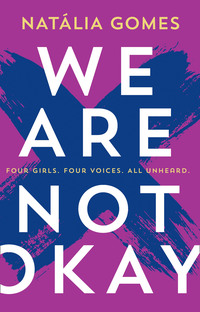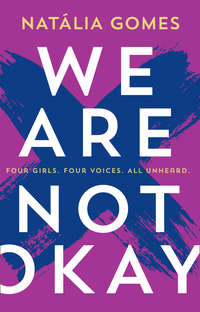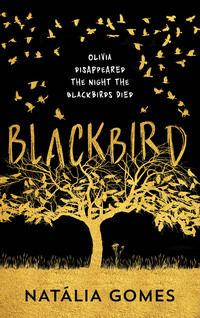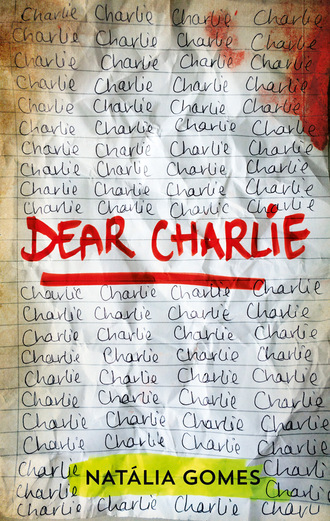
Полная версия
Dear Charlie

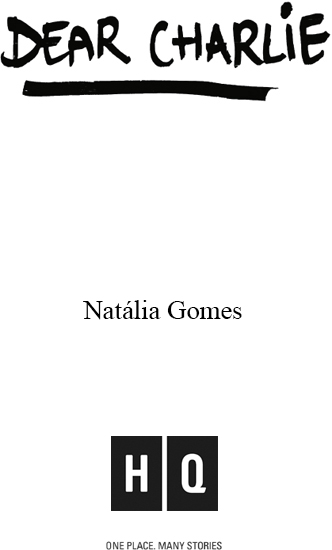
NATÁLIA GOMES graduated from the University of Stirling with a BA in Media & Journalism Studies, and went on to receive her Master’s degree in Education in the US. She currently works in a public school system to increase educational opportunities for students with special needs. Previously, Natália Gomes wrote for the London-based online student political magazine, deAlign and stage-managed student plays at the Lee Strasberg Theatre Institute in New York City where she attended for two years.
She currently divides her time between the US and Scotland, but hopes to spend more time at her cottage in Hay-on-Wye in Wales.
Dear Charlie is her debut novel.
To my family and Nick for their endless support
Contents
Cover
Title Page
About the Author
Dedication
Chapter 1: ‘One to Another’ (The Charlatans, Summer 1996)
Chapter 2: ‘Everything Must Go’ (Manic Street Preachers, Summer 1996)
Chapter 3: ‘What Would the Community Think?’ (Cat Power, Autumn 1996)
Chapter 4: ‘The Circle’ (Ocean Colour Scene, Autumn 1996)
Chapter 5: ‘6 Underground’ (Sneaker Pimps, Autumn 1996)
Chapter 6: ‘Head Over Feet’ (Alanis Morissette, Autumn, 1996)
Chapter 7: ‘Look on Down from the Bridge’ (Mazzy Star, Autumn 1996)
Chapter 8: ‘When You’re Gone’ (Cranberries, Autumn 1996)
Chapter 9: ‘No Place to Hide’ (Korn, Autumn 1996)
Chapter 10: ‘Swallowed’ (Bush, Autumn 1996)
Chapter 11: ‘Breathe’ (Prodigy, Autumn 1996)
Chapter 12: ‘Follow You Down/Til I Hear it From You’ (Gin Blossoms, Winter 1996)
Chapter 13: ‘She’s a Star’ (James, Winter 1996/1997)
Chapter 14: ‘Alone’ (Dinosaur Jr., Spring 1997)
Chapter 15: ‘One Headlight’ (Wallflowers, Spring 1997)
Chapter 16: ‘Sunday Morning’ (No Doubt, Spring 1997)
Chapter 17: ‘Say Yes’ (Elliott Smith, Spring 1997)
Chapter 18: ‘Halo’ (Texas, Spring 1997)
Chapter 19: ‘Let Down’ (Radiohead, Spring 1997)
Chapter 20: ‘It’s No Good’ (Depeche Mode, Spring 1997)
Chapter 21: ‘The End is the Beginning is the End’ (Smashing Pumpkins, Summer 1997)
Chapter 22: ‘Staring at the Sun’ (U2, Summer 1997)
Chapter 23: ‘Heroes’ (Oasis, B-Side, Summer 1997)
Chapter 24: ‘Bitter Sweet Symphony’ (The Verve, Summer 1997)
Copyright
Chapter 1
‘One to Another’ (The Charlatans, Summer 1996)
Dear Charlie,
I’m sorry it’s taken me seven weeks to write this. Honestly, I still don’t know why I am. It’s not like you will ever get to read it. It’s not like you will ever know how I am feeling. I can’t change anything, certainly not the past couple of months. And no matter how hard I try, I can’t forget. I’ll never be able to forget.
The strange thing is, I can’t stop thinking about the small things, like what I had for breakfast that morning, what music I listened to on the radio while I ate, why I chose blue jeans over black cords. But that’s just it. These thoughts fill my head all day, but when I open my mouth to share them, I can’t. I just can’t.
My therapist says if I can’t talk about it then maybe writing in a journal will help me. Like I’m the one who needs help in this family. Yes, I am seeing a therapist. That’s how bad things have got around here.
I don’t even know where to start. Everything’s changed. Mum flits between total denial and hysterics, almost on a daily basis. One minute she acts like she really believes you’re just upstairs doing your homework or listening to music, and the next minute it’s a complete emotional breakdown all over again. She relives your death every day. My therapist says this is normal, but I’m beginning to question whether there really is a criterion for measuring normality in this kind of a situation.
Dad remains a total enigma as usual, occasionally ranting and pointing fingers. But most of the time he doesn’t say anything, for days sometimes. I don’t know what is happening in his head, but then again we never did. We do seem to have one thing in common – we both haven’t cried, not one tear. I don’t see the point. Tears won’t reverse your actions, or bring you back. Tears won’t let me forget, even if that was possible.
You don’t have to look far for Dad now. He’s either sitting in front of the TV or has locked himself in the garage, but I don’t blame him. I don’t go outside much myself. We’re famous now, just like you always wanted. Our pictures are always in the newspapers, even our house. They keep using the same photo of you. It’s your yearbook picture from last year, the one where you let your hair grow out for it. Mum was so mad at you. She said you didn’t look like yourself, which is funny now because obviously we didn’t know you at all.
Your room is the same as you left it. Or at least, we think so. The police conducted a search of your bedroom not long after. Mum tried to put the pieces back together. She’s always trying. I wasn’t much help. I hadn’t been in your room in weeks, maybe even months. Either you stopped inviting me in, or I stopped asking to come in. Honestly, I don’t remember.
A pair of your shoes is still sitting by the door, next to mine. I see them every time I walk past the door, which I do more often now. I like to look out the window and see the photographers waiting for us beyond the garden. I hide behind the lace curtain, but they probably know I’m there. Occasionally I’ll see neighbours walk by, but they usually cross the street to avoid passing our house. Perhaps they think it’s a disease that they might catch – a contagious need for death and disorder. Maybe they think I have it too. Maybe I do.
I can’t fathom a bigger emotional mess for someone to have left behind. I wonder if you knew that this would happen. I wonder if you thought about anything at all before you walked into that assembly hall at 8.22am on the last day of school.
Pembrook Academy is still closed. I read in the newspaper on Tuesday that the assembly hall will be torn down and replaced with a memorial garden. The remainder of the school will re-open to students by Christmas. But I won’t be there to watch the thick yellow tape being cut by the new headteacher.
They hired a woman this time, and I bet she’s not as strict as Mr Healey. I still remember that time you pulled the fire alarms in the building and set off the sprinkler system. It went down as the best prank in history – in the 1994 yearbook anyway. You were suspended for five days around the time that I had the flu. I always thought that you did it only so you could spend those five days with me, playing Doom on Dad’s PC and prank-calling strangers from the phonebook – Mr Dungworth, Mrs Shufflebottom. My sides ache just thinking about that. I never laughed so hard. I never did thank you for that.
Thinking about it, I don’t remember a time that you ever got sick. You were always the strong one in the family. You worked weekends in the Spar when Dad got laid off, you stood up to him when he got drunk and shouted at Mum, and you put a plaster on my cuts and gave me a slap on the back whenever I came home with a bleeding knee. I don’t know who’s going to be the strong one now.
Whenever I think about the future, I get a pain in my chest that won’t go away. It sucks the breath out of my lungs and makes me feel like I’m drowning in a big swimming pool where no one can see me. So, most of the time I try not to think about the future – that’s what Dr Albreck told me to do. She said, ‘Focus on the now, Sam. The future can wait,’ which actually contradicts what my guidance advisor used to tell us in the university prep classes. Regardless, I’m going to try it Dr Albreck’s way. But that doesn’t mean that I agree with going to therapy.
What else is new? The new headteacher is called Sheila Bevins. I only know that because I opened a letter that she sent to Mum and Dad. In it she said, ‘It would be in the best interest of the students and their families that your son Samuel Macmillan not return to Pembrook Academy. Although we are sensitive to your loss, we feel it best to move forward with a fresh start and not be reminded of the past.’
I didn’t realise that my existence was a reminder of the past. I don’t even care. I laughed when I first read it, as if my absence from the halls could erase what happened. Nothing will erase what happened. When students return to Pembrook, they might not see the blood on the walls but it’s still there and always will be. They’re idiots for thinking that they can forget. I don’t need to be there to remind them, there are enough shadows to darken the halls of that school regardless of whether I am there or not.
It’s a shame too, because I was really getting good at making friends. I even got an invite to Jackson’s party last weekend, well technically Geoff did but I was going to go with him. It was cancelled, of course. And, I was planning on asking Sarah Reynolds to go to the cinema with me to see Mission: Impossible, although I doubt she would have said yes. She’s a year older and was supposed to be going to Edinburgh University in September, but I don’t know if she’ll go now. Plus she probably would have wanted to watch Flipper or something.
You missed my birthday. You and I were meant to see the sequel to The Crow. You were obsessed with the first one. It’s in the cinema right now, but I don’t think I’ll ever be able to watch it. Not now, not ever. Why would you make plans with me if you never intended to keep them?
I saw Sarah Reynolds at the funeral – we had just one for all those who died that day. She was wearing a dark navy dress with shoes that made her look taller than she is. Her face was red and blotchy, like the others. I wanted to wave, but I didn’t think she would want to see me. I read in the newspaper the following day that over five hundred people showed up for the funeral. I didn’t even know we had five hundred people in this small town. I wish I could have stood with them but I watched from a distance. I rested my bike beside a large oak tree and watched from behind it.
I shouldn’t have been there, I was asked not to go. But I had to see whether they would acknowledge your death too. I wanted to know if your yearbook photo would be blown up to the size of a movie poster and placed on a black iron easel beside the others. But it wasn’t. They honoured every student and teacher who died, but not you. Instead, we cremated your body two days after. I don’t know if a cremation is classed as a funeral service but if it was you would have liked it – short and straight to the point. No funny anecdotes about you or depressing poems about angels and heaven. I wish I could tell you that five hundred people came, but the only people who attended were Mum and I. Not even your best friend Adam came. I’m sorry. I’m sorry for a lot of things. Maybe if I had been a better little brother then I would be watching television with you downstairs right now rather than holed up in my bedroom with the curtains closed, hunched over a journal that a therapist told me to buy.
Mrs Bell and that kid from your Chemistry class are still in the intensive care unit at the hospital. They’re both expected to live, if they ever wake up. You single-handedly wiped out the rugby team. I don’t think I’ll miss many of them, especially not Gregory Dunn. Their glass showcase will be empty this year. No trophies, medals or team photos will fill the space. Maybe it will finally be awarded to the Music Club or the Writers’ Workshop group. Maybe some of the others will finally get their chance to shine at Pembrook Academy. Is that why you did it?
I read that you walked right by the art department, without even looking in. People speculated that you didn’t think anyone was in there, but I know why you did it. Anyone who really knew you would know why you skipped that wing. But that’s the tragedy in this whole mess. No one really knew you. Not even me, it seems. You always said that the art teacher Mr Allans was the only one in that whole building who acknowledged you. And I think walking on by was your final gift to him.
They released the music teacher last week after his leg surgery was successful. The gym teacher didn’t make it. He died in the first week. The redhead girl that you fancied in Year Three was the last to pass away. She died on the 16th of July from ‘prolonged complications’. Her parents published a full-page obituary the next week. Mum wanted to write something for you in the newspaper, but Dad wouldn’t let her. He said no newspaper would print it.
I feel suffocated by the silence around me. The brutal stillness occupies every room in the house, and I can only imagine that outside is worse. Charlie, I’m dying. I can’t breathe and there’s no one that I can talk to. The only people who want to listen are a blurred mass of social workers, grief counsellors and journalists. And those who I reach out to are not there any more. You are not here any more. You made choices – selfish choices – that I hate you for. But then there are times that I don’t hate you. There are times where I keep pounding my forehead until it bruises and aches, just to stop myself from exploding within.
My therapist says I am ‘bottling up emotions which is dangerous.’ Perhaps she is afraid that I will follow in your footsteps. I don’t think anyone will be able to. You changed history. You made a name for yourself. You will always be remembered – well done. If this is what you wanted, you got it. You’re immortalised, while the rest of us are stripped clean of any future we may have had. I hate you so much!
I don’t hate you.
I don’t know how I feel.
After I’m finished, I’m going to hide this. Maybe I should put my journal in your room. No one will touch it in there, especially not Dad. He’s so angry at you right now, but I think that will change over time. At least, I hope so. This family will deal with hatred, remorse and bitter negativity every day of our lives. We don’t need it from Dad too. He blames Mum. He blames me. He blames videogames, music and social pressures put on young people today. He even blames the school and their apparent lack of vigilance and security measures. He blames lax gun regulations that apparently make it easy for an eighteen-year-old to get access to an unlicensed handgun. The one person he does not blame is himself. He believes he’s innocent in all of this. That’s why I have to hide the journal. I don’t want anyone to read this, and know what I’m thinking. I don’t want Dad to know that I miss you. God, I miss you so much Charlie. How am I going to get through this?
Chapter 2
‘Everything Must Go’ (Manic Street Preachers, Summer 1996)
‘So, how do you feel?’
Although this was only my third session, Dr Albreck had already fed into every stereotype one could have about a therapist – leather sofa, plant in the corner of the room, box of tissues within reach, and the occasional smile and nod to remind me that she was still listening. And, of course, she always asked me, ‘How do you feel?’
Honestly, I didn’t know how I felt. I never did. Even if I could identify just one of the emotions that stirred within me, I wouldn’t want to give it to her. All she would do with those words is write them down in her black leather notepad. She wouldn’t absorb them. She wouldn’t understand them. And she certainly wouldn’t help me feel any differently.
‘Fine,’ I finally answered.
‘What does “fine” mean, Sam?’
‘I’m not sure how to exactly describe it. I don’t have a dictionary with me.’
She smiled, although I could tell it wasn’t genuine. ‘What I mean is, “fine” isn’t a feeling.’
I stared at her, biting my lip while waiting for a chance to unload all of my thoughts like a heavy suitcase being unpacked after a long journey. There had been so many words written in the newspapers about how my family should feel – ashamed, guilty, ignorant. It didn’t matter how I felt, or what words I used to describe it because there would always be someone ready to tell me what to feel. I just wished someone would tell me what to say.
‘I can see this is a difficult question for you, as usual. So, let’s start with something easier. When is your first day of school?’
‘Two weeks on Monday.’
‘And how do you feel about that?’
There it is again – the need to talk about feelings. ‘Well, I’ll be starting a new school where everyone will know my name before I even step into the building, so I guess I don’t feel fine.’
‘Good.’ She leaned forward in her chair, apparently pleased with my response. ‘Sam, everyone who has faced – and survived – a traumatic event like you have finds themselves at what I like to call a “Turning Point”. It’s at this point where you decide whether you want to let go of everything and move forward, or stay stuck in the past. This new school could be your turning point. You should consider giving it your all. Keeping that in mind, are you planning on joining any clubs or afterschool programmes? They provide wonderful opportunities to make friends. How about the music club?’
‘I was thinking of joining Teens Against Violence. What are your thoughts?’ I said, crossing my arms and leaning back in the chair.
For a moment I thought she was going to smile but she didn’t. ‘I think that’s a very good idea, Sam. Getting involved in your new school will be the fastest route to immersing yourself into that community. Immersing means – ’
‘ – I know what immersion means.’
‘Of course. You’re a bright young man Sam. Are you still playing the cello?’
‘Piano. Not so much, any more.’ I intertwined my fingers, pressing deep into my knuckles. Resting my hands on my lap, my eyes skimmed over the walls thick with framed certificates and awards. I wondered how much each session with the great Dr Elizabeth Albreck cost. Fifty pounds an hour? Less? More? I considered asking her directly, but I had a more important question on my mind. ‘How long do I have left?’
‘Why do you ask?’
‘Because you don’t have a clock in here.’ I thought that was obvious. Maybe she didn’t know.
‘I prefer not to remind my clients of the passing of time. I want them to feel safe and heard, without the pressure of a clock hurrying them along.’
‘How do you know when the session is over?’
‘It’s over when it’s over.’
‘So, what if I was to sit here all morning?’
‘Why would you do that, Sam?’
‘It’s just a hypothesis, Dr Albreck,’ I smiled. Getting dismissed from therapy might be easier than I had thought.
‘I guess I would ask you to bring whatever thoughts were going through your mind to our next session?’
‘You mean, hurry me along?’
‘No, not hurry you along. But gently inform you that I have other clients to see other than you.’
‘So, you do keep track of time?’
‘Not exactly. Again I don’t like to remind my clients – ’
‘ – But by “gently informing” me, you’d be reminding me of the passing of time, thus adding pressure.’
‘Sam, we’re getting way off topic. Let’s go back to talking about your new school,’ she sighed, uncrossing her legs and then re-crossing them.
‘But we can’t,’ I shrugged, getting up off the sofa and grabbing my hoodie off the edge.
‘And why is that?’ she asked, sliding her glasses off her thin face that wore a tired expression.
‘Because according to the large watch on your wrist that you kept glancing down at, we’re all out of time.’ I leaned over and popped a green mint into my mouth from the glass bowl that sat on the table by her black-skinned planner. And as I pushed open the door to the waiting room, I heard her notebook slam shut.
Unlocking my bike from the metal grid in the car park, I swung a leg over and pushed my foot down hard on the pedal. Dr Albreck’s office shrank behind me until it became no more than a dot in the distance. Only seven more sessions to go. Four hundred and twenty more minutes that I would have to sit on that leather sofa and face questions that I didn’t have the answers to.
The late summer wind whipped at my face, a non-existent chill stinging my skin. I pedalled harder and harder, faster and faster. The wheels spun wildly like a washing machine, going around and around. I lifted off the seat and leaned to the left, the bike curving around Knockturn Lane onto Knockothie Brae. Small square semi-detached houses lined the streets, their brick roofs blending into one thick blurry stream of red as I sped past. Around the corner into Findhorn Drive, past Market Brae, down onto Pembrook Road – I slammed the brakes on.
There it was. Pembrook Academy. How could I have gone down this way? I should’ve taken the right onto Golfview Road and gone past the golf course. But I didn’t think. Or perhaps I did, and this was where I really wanted to be. My body was ready to confront my ghosts before I was.
My chest heaved in and out, as my lungs struggled to gasp air. Lips parted, eyes open wide, I just stared at the pale-yellow building. It was bigger than I remembered. Or maybe smaller. The rectangular windows, methodically spaced out only inches from each other, were in darkness. Wooden boards covered up the broken windows on the first floor, where students and teachers had tried to escape. A chair lay on its side, having been thrown through the window to break it. Shards of glass still lay on the tarmac beneath the frames. Yellow strips of ‘Do Not Enter’ tape crossed the exit doors and the main entrance. On the front steps lay a black shoe, as if someone had left it behind as they ran from the building.
Several contractors had publicly turned down the opportunity of ‘refurbishing’ Pembrook Academy. I guess no price was high enough to clean blood off the walls. As far as I knew, the school council was trying to hire a company from the city, where the echo of screams was slightly quieter.
I squeezed my eyes shut, biting down on my lip until I tasted warm blood. I could hear them even though I hadn’t been there – the desperate screams, the frantic 999 calls, the smashing of the windows. It was so loud in my ears. I pressed my hands into my ears. ‘Stop,’ I whispered, ‘please stop.’ But it didn’t stop. The screams got louder, more high-pitched, and the sound of glass shattering became deafening.
‘Sam?’
I blinked my eyes open and saw the outline of someone that I used to know, someone that used to be my friend. I opened my mouth to say hello but suddenly that felt stupid. A simple hello wouldn’t be enough. It wouldn’t even come close.
Geoff stood in front of me, his hands trembling as they held a small bouquet of carnations wrapped in thin plastic and tied with yellow ribbon at the bottom. As my eyes skimmed the ground by his feet, I noticed more bouquets and ribbons like his. Flowers, small teddy bears and cards littered the pavement all around the perimeter of the school. Most lay on the ground, resting against the knee wall while others were tied to the metal bars of the gate. There were so many flowers, gifts, messages to loved ones and missed ones. I shouldn’t have been there. I mounted my bike and turned around, slamming down on the pedals as they propelled me away from the school and the people I used to know. And from the friends I used to have.


